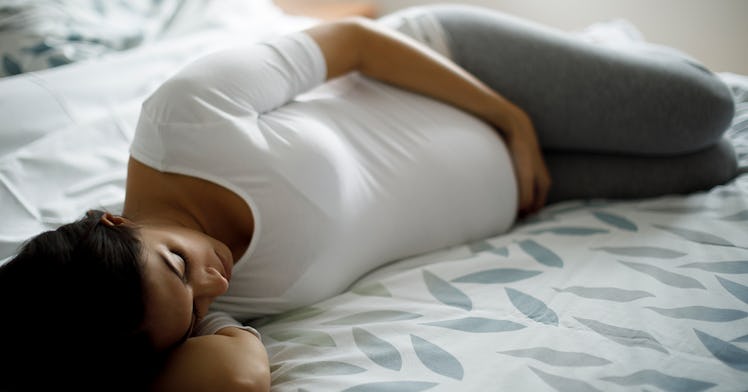How COVID-19 Complicates Pregnancy — Even if You Don’t Have the Virus
“Simply because they’re not likely to be severely infected does not mean they aren’t affected."

COVID-19 is straining the healthcare system. Hospitals are running out of personal protective equipment and ventilators, and many doctors have canceled non-essential appointments and surgeries. Pregnancy, however, cannot be postponed. Though experts have some concern that pregnant women and newborns could become severely ill with the novel coronavirus, the risk likely isn’t that high, says Neel Shah, professor of obstetrics, gynecology and reproductive biology at Harvard Medical School. But the virus is still a major issue for pregnant women and infants. “Simply because they’re not likely to be severely infected does not mean they aren’t affected,” Shah says.
Even families that are healthy will face pregnancy challenges in the face of COVID-19. It may be more difficult to see a doctor for prenatal check-ups, and delivery rooms may limit the number of visitors allowed. Some women are switching to home births to limit their risk of infection from hospitals, but changing your birth plan can come with a host of other risks. Here’s what you need to know for all stages of pregnancy during the pandemic.
COVID-19 and Prenatal Care
To keep pregnant women out of medical offices where they could be exposed to COVID-19, some doctors are moving online. Telemedicine visits are sufficient for most check-ins, says Denise Jamieson, chair of gynecology and obstetrics at Emory University School of Medicine. Doctors may also ask pregnant women to track their own weight, blood pressure, and blood sugar at home. If a woman needs a visit to the office, she may have an ultrasound and lab work done in one location at one time to limit exposure. New guidelines from the American Journal of Obstetrics & Gynecology MFM recommend that pregnant women leave support people at home during in-person visits.
Pregnant women may also see a decrease in prenatal appointments, but there’s not much scientific evidence supporting the high number of visits low-risk women usually have anyway. High-risk women such as those with diabetes, are older, or who are expecting twins may need more in-person visits. This may become difficult if the United States faces a shortage of healthcare workers. Different regions are preparing for the scarcity of providers by, for example, pulling healthcare professionals out of retirement or graduating medical students early. Hospitals are also preparing to pull specialists, which could include obstetricians, to work in emergency care for COVID-19 patients.
COVID-19, Labor, and Delivery
“Health systems are ensuring that labor and delivery units maintain the highest standards of infection control,” Jamieson says. Some hospitals, for instance, are limiting the number of visitors pregnant women can have in the delivery room. Many women are only being allowed one, so they must choose between a spouse, family member, or doula. Some moms-to-be are making alternative plans, such as video calling their doulas for support through labor and childbirth.
Two hospital systems in New York, Mt. Sinai Health System and New York-Presbyterian moved to not allow any visitors into labor and delivery rooms. New York State shot down this move. Continuous support by a professional such as a midwife or doula, after all, has been shown to lead to shorter labor and a healthier baby at birth. Support by a friend or family member increases a woman’s overall satisfaction with her birth, according to one expert review. “It is ideal to have support for laboring women. However, these are unprecedented times,” Jamieson says. Still, “depending on where your local area is in terms of the number of cases and prevalence, it may actually be safer to not have any support people.” After giving birth, women may be sent home earlier than usual to avoid infection and free up hospital beds.
COVID-19 and Postpartum Life
Even under the best of circumstances, the postpartum period is trying for new mothers. The pandemic will likely make it worse. Even healthy parents ready to bond with their baby are cut off from the rest of the world. “Moms and their babies should be self-quarantined at home,” Jaimeson says. Grandparents and other relatives should not meet the newest member of the family face to face for the time being. Newborn infants up to six weeks old are prone to all types of infections, Jamieson says, “but I think it’s even more important during this era of COVID that moms and babies really limit contact.”
The loneliness of quarantine may build on other emotional issues women experience after birth. Eighty percent of mothers experience “baby blues,” including symptoms of mood swings, sadness, anxiety, loss of appetite, and difficulty sleeping that usually last two to five days but can stretch up to two weeks. Symptoms that last for more than two weeks are likely postpartum depression, which new mothers should have routine screening for. Mothers can get screened and receive other postnatal check-ups via telemedicine. Just like everyone else, they should also think about how to fight off loneliness during the quarantine. “Postpartum women need to think carefully about coping strategies for how to stay connected,” Jamieson says. Simply put, it’s not an easy time to have a child and reaching out — via video chat, text, or email — will go a long way to make it more bearable and, importantly, a celebration.